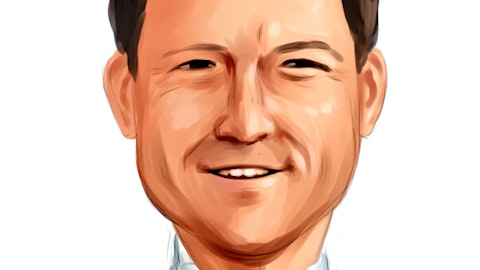Nick Grasberger: Well, I certainly think we learned in the second-half of the year that our value proposition and its importance to our customers enables us to get price when it’s justified as it certainly was in the second-half of the year. Now we’re also increasing prices. Our annual price increase early this year, which we also expect to have a high realization rate. So yes, I would say that the value proposition that we have in both hazardous waste and contaminated soil. Is one that should enable us to gain price going forward.
Michael Hoffman: Okay, great. Thank you.
Operator: And the next question today comes from Larry Solow at CJS Securities. Please go ahead.
Larry Solow: Great. Good morning, Nick and Pete. Just a couple of follow-ups on — good, good. On the Clean Earth, so essentially are you saying that volumes are going to be at least on the hazardous side pretty flat this year and it’s mostly price and then maybe a little incremental just kind of summarize it. Incremental benefit from infrastructure and dredging. Is that sort of the summary of the drivers are cleaner this year?
Nick Grasberger: Yes. And cost reduction, operational cost reduction. We have also removed some overhead costs, but the impact of those are largely being mitigated by inflation and some compensation related matters. But yes, the plan, the growth year-over-year is being driven by price and cost. I will say that our pipeline of growth opportunities both in haz waste and in soil are quite robust. We just simply not built in the benefits of those.
Larry Solow: And the limitation on growth in hazardous is, like you said, it’s basically — it’s just capacity and ability to incinerate and make room for more stuff essentially for you to process?
Nick Grasberger: Well as well as the overall economy, sorry.
Larry Solow: Right. Fair
Nick Grasberger: that in the overall economy. The outlook for retail and industrial in particular.
Larry Solow: And basically on the soil side, it’s really — it’s more timing and your visibility on that is still limited, it sounds like?
Nick Grasberger: Right. Better than it has been the previous couple of years also.
Larry Solow: Right.
Nick Grasberger: And again, I think we’re being a bit cautious on (ph) volumes.
Larry Solow: Sure. And then just switching gears a little bit. So on the environmental side, obviously, I think it’s more a victim of just a slower production on Environment this year. Obviously done a great job in cost cutting and all that good stuff. What about just longer term, just ability to obtain new contracts? I know it’s sort of a fine line, but you’re still fairly levered. Obviously, you want to kind of reduce this leverage, improve your free cash flow, but how do you kind of get new wins and new business wins without some investment?
Nick Grasberger: Yes, it’s a great question. It’s something we’re very focused on. If you consider how Harsco Environmental truly adds value to its customers, right? It’s around engineering and know-how and new environmental solutions and the skill of our labor force et cetera, et cetera. If not, right utilizing our balance sheet to fund these assets to perform the service. So I think over time and you’ve — this Phoenix bankruptcy provides a bit of an opportunity, I think for us to drive our true value proposition. The fact is that our customers’ balance sheets are healthier than ours. Their cost of capital was lower than ours. And so you put all that together and we’re going to push pretty hard to see if we can win some new contracts here on more of a capital light basis.





